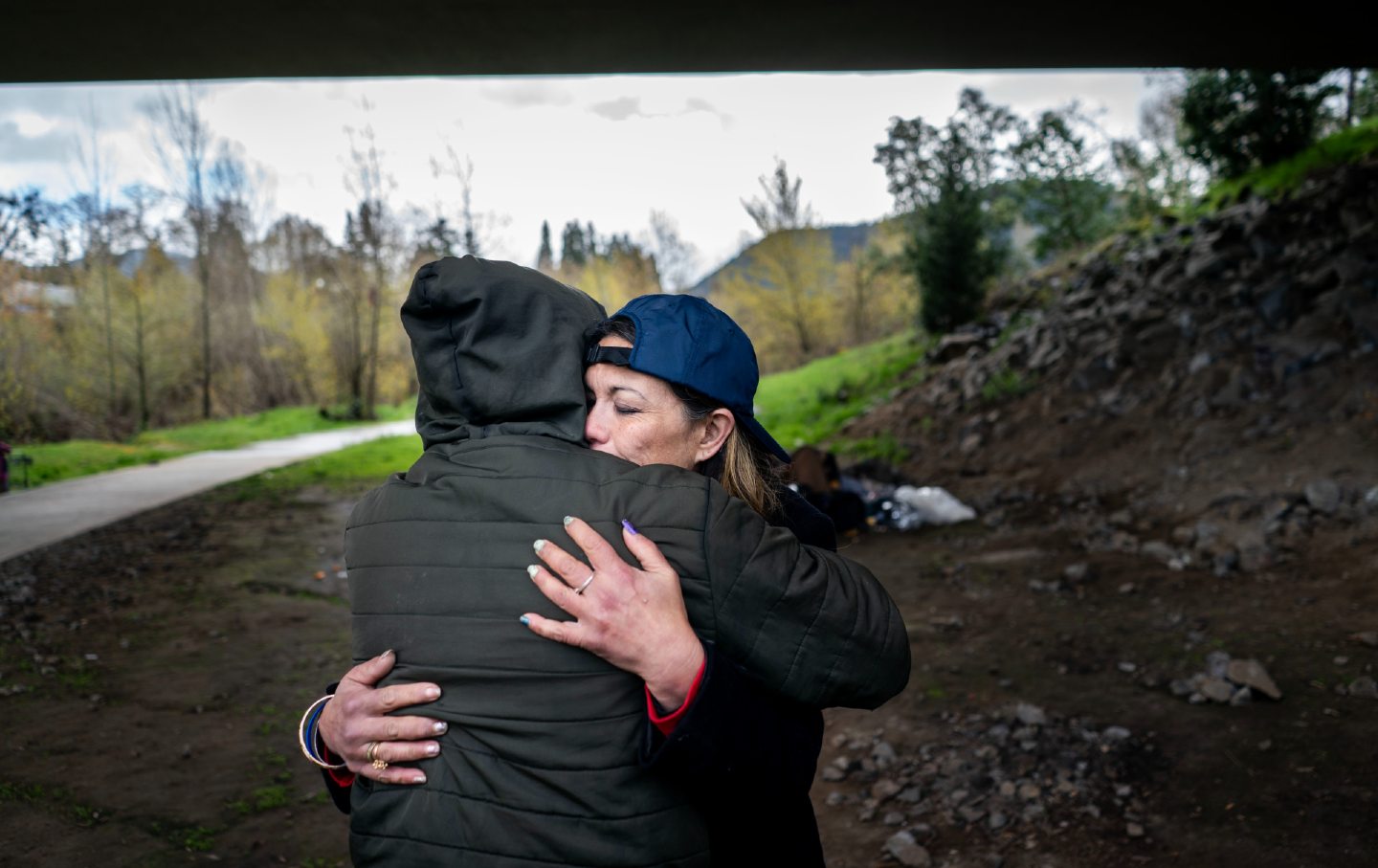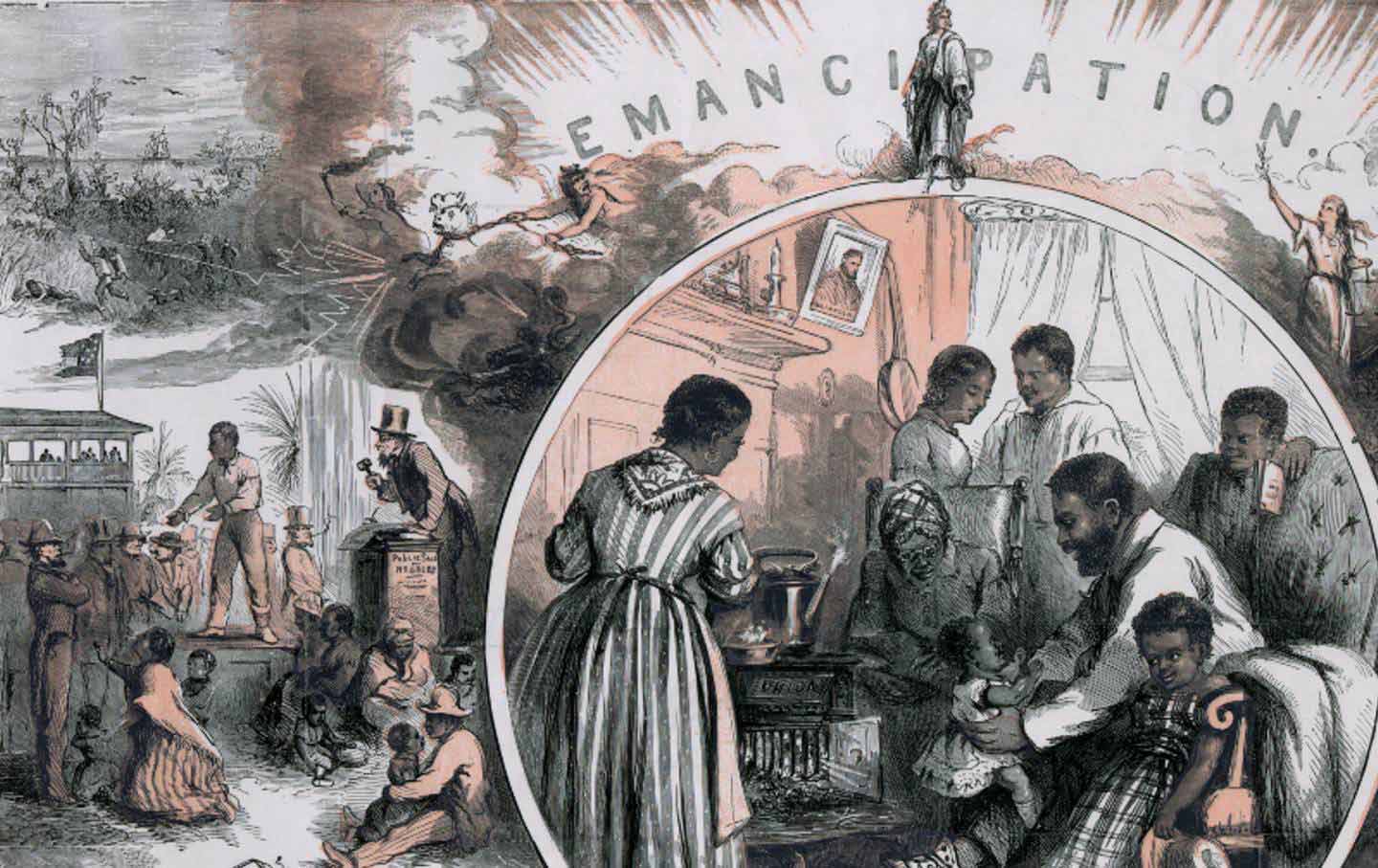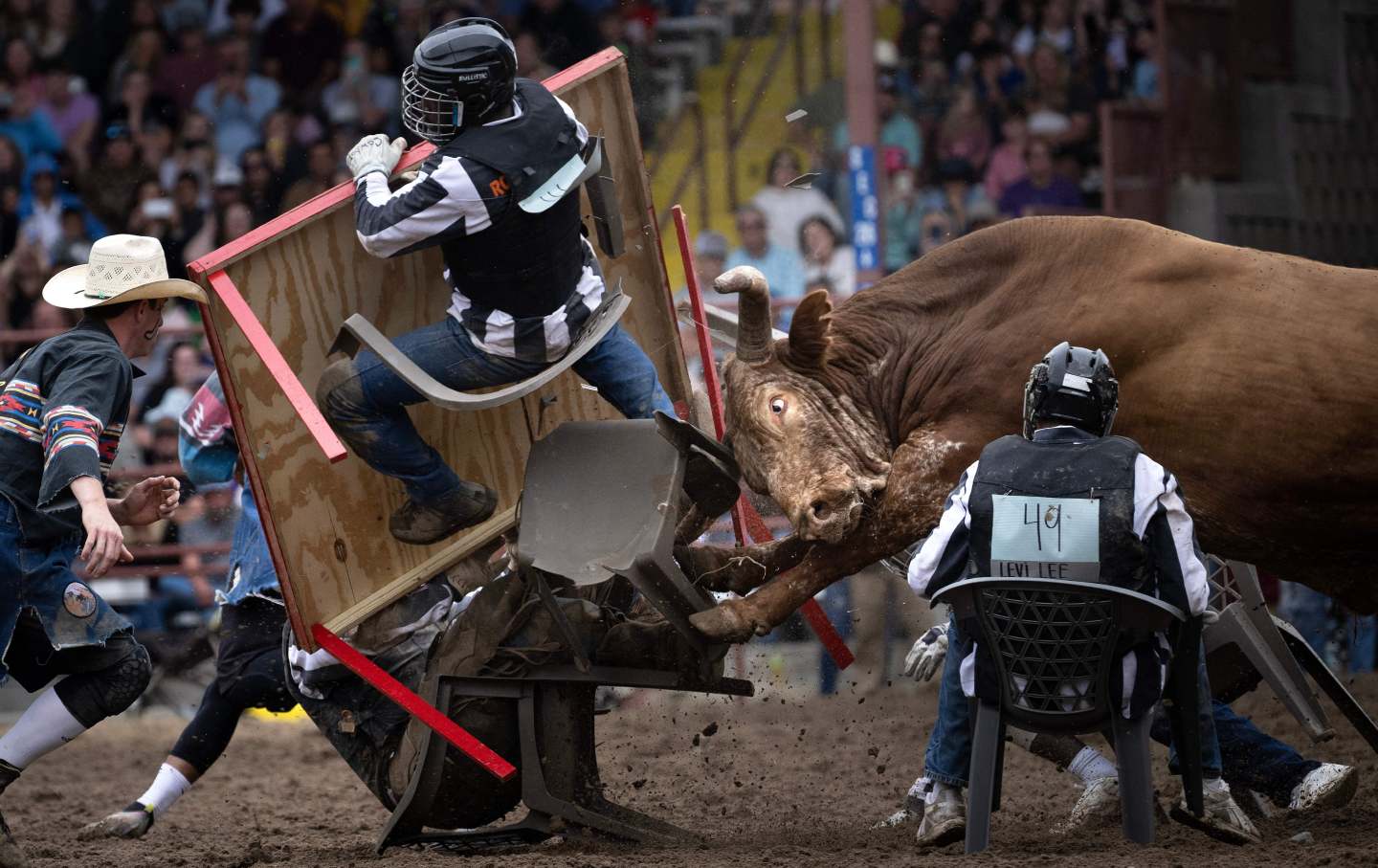Is Punishing People for Not Having a Place to Sleep Cruel and Unusual?
With Grants Pass, the Supreme Court appears set to allow cities, counties, and states to criminalize homelessness.

On a sunny, cold February day, I drove four hours from Portland, Oregon, to Grants Pass, a town of about 40,000 in the southern part of the state. I wanted to talk to residents about the homelessness crisis there and ask whether they thought the city should still be allowed to punish its roughly 600 unhoused people for not having a home.
Grants Pass has no operating emergency shelter. Yet a few years ago, it passed a number of anti-sleeping laws that made it impossible for people in the city without homes to avoid constant fines and jail time. Then, in 2022, the Ninth Circuit Court of Appeals issued a permanent injunction to bar the enforcement of such anti-homelessness provisions.
I headed to Morrison Park, where four people sat around a picnic table next to a pair of tents and a pickleball court. After I pulled into the parking lot of a carpet store across the street, a man came out to talk to me. He was angry about the people in the park, telling me that it was ridiculous that “people”—meaning people with homes—could no longer use their public spaces. He wanted to punish the homeless. Liberal policies, he said, had created chaos in deep-red southern Oregon.
Donald Trump won Josephine County, where Grants Pass is located, by 26 points in 2020, but Republicans are not alone in their antipathy toward the unhoused. The failure to generate affordable and supportive housing is bipartisan and widespread.
Between 2021 and 2022, the number of people experiencing homelessness increased in 41 states. Western states reported especially high rates. Between 2020 and 2022, Oregon saw a 22.5 percent spike in homelessness.
Two months later, I was on the other side of the country, at the Supreme Court, to hear the oral arguments in Grants Pass v. Johnson, a case that will determine whether city ordinances that impose civil or criminal penalties for involuntary homelessness constitute cruel and unusual punishment.
The case made its way to the Supreme Court largely because the Grants Pass ordinances were especially harsh. In addition to banning the use of bedding materials “for the purpose of maintaining a temporary place to live,” the city would sometimes shut off the water and close public restrooms in the parks. Helen Cruz, who has lived in Grants Pass since she was 4 and has been intermittently homeless, told me the ordinances were intended to make life uncomfortable enough that people would leave. “One cop even asked me, ‘Well, why don’t you just move?’” she recalled.
Liberal cities in the Ninth Circuit, such as San Francisco and Los Angeles, filed amicus briefs supporting neither party, and district attorneys from San Diego, Sacramento, and other blue cities joined Idaho, Montana, and 22 other states that support the city of Grants Pass and claim that the Ninth Circuit’s injunction removes the punitive tools needed to solve local homelessness issues.
The justices spent the two and a half hours of oral arguments discussing where the line should be drawn between the status of being homeless and the conduct associated with it. The status precedent comes from a 1962 case, Robinson v. California, which determined that a person cannot be punished simply for being addicted to narcotics. The justices ruled that the Eighth Amendment prohibits the state from punishing an act or condition if it is the unavoidable consequence of one’s status or being.
Ticketing people for having nowhere to go penalizes them for not being able to overcome skyrocketing rents, low wages, and a lack of healthcare. If the court—as seems likely—rules that cities, counties, and states can criminalize sleeping outdoors, this crisis will get worse. Laws likes the ones in Grants Pass will push unhoused residents further into poverty, harming their mental health and potentially leading to substance-use disorders.
Ask any case worker about homelessness, and they will list the barriers their clients face in obtaining housing: prior evictions, criminal records, and the inaccessibility of healthcare. Note that “lack of jail time” and “too little debt” are not on the list.
Even right-wing Justices Brett Kavanaugh and Amy Coney Barrett asked the counsel for Grants Pass where homeless people are expected to go after serving a jail sentence. The lawyer said that the jail would hypothetically connect people to services, but she had no good answer for what happens when housing and services are not available.
As in other places, people with disabilities, people of color, and LGBTQ individuals are disproportionately represented in the homelessness statistics for Grants Pass. All the homeless residents I spoke with had experienced trauma. We know what helps homelessness: affordable housing and healthcare.
Back in February, Helen Cruz told me there was a third thing that could help—something the Supreme Court could make more difficult. “People out here, they’ve got nothing to lose and nothing to look forward to,” Cruz said. “Just give them a little bit of hope, because a lot of them out there have none.”
We cannot back down
We now confront a second Trump presidency.
There’s not a moment to lose. We must harness our fears, our grief, and yes, our anger, to resist the dangerous policies Donald Trump will unleash on our country. We rededicate ourselves to our role as journalists and writers of principle and conscience.
Today, we also steel ourselves for the fight ahead. It will demand a fearless spirit, an informed mind, wise analysis, and humane resistance. We face the enactment of Project 2025, a far-right supreme court, political authoritarianism, increasing inequality and record homelessness, a looming climate crisis, and conflicts abroad. The Nation will expose and propose, nurture investigative reporting, and stand together as a community to keep hope and possibility alive. The Nation’s work will continue—as it has in good and not-so-good times—to develop alternative ideas and visions, to deepen our mission of truth-telling and deep reporting, and to further solidarity in a nation divided.
Armed with a remarkable 160 years of bold, independent journalism, our mandate today remains the same as when abolitionists first founded The Nation—to uphold the principles of democracy and freedom, serve as a beacon through the darkest days of resistance, and to envision and struggle for a brighter future.
The day is dark, the forces arrayed are tenacious, but as the late Nation editorial board member Toni Morrison wrote “No! This is precisely the time when artists go to work. There is no time for despair, no place for self-pity, no need for silence, no room for fear. We speak, we write, we do language. That is how civilizations heal.”
I urge you to stand with The Nation and donate today.
Onwards,
Katrina vanden Heuvel
Editorial Director and Publisher, The Nation
More from The Nation

Mr. Scarborough Goes to Mar-a-Lago Mr. Scarborough Goes to Mar-a-Lago
The hosts of Joe Biden’s favorite political talk show have quickly pivoted to kissing the ring of the incoming president.

Watching a Parallel Media Try to Make Trump the Big Sports Story Watching a Parallel Media Try to Make Trump the Big Sports Story
The president-elect did not dominate the world of sports this weekend, but Fox News and Internet tabloids are inventing new realities.

The First Amendment Will Suffer Under Trump The First Amendment Will Suffer Under Trump
Given what’s heading our way, we need a capacious view and robust defense of the First Amendment from all quarters.

Slavery in an Age of Emancipation Slavery in an Age of Emancipation
Robin Blackburn’s sweeping history of slavery and freedom in the 19th century.

How Wisconsin Lost Control of the Strange Disease Killing Its Deer How Wisconsin Lost Control of the Strange Disease Killing Its Deer
Despite early containment efforts, chronic wasting disease has been allowed to run rampant in the state. That’s bad news for all of us.

The Prison Rodeo at the Heart of Legal Enslavement The Prison Rodeo at the Heart of Legal Enslavement
Angola prison workers make between 2 and 40 cents an hour. They also have a controversial outlet for recreation and to vend their wares at market rate: a rodeo.


